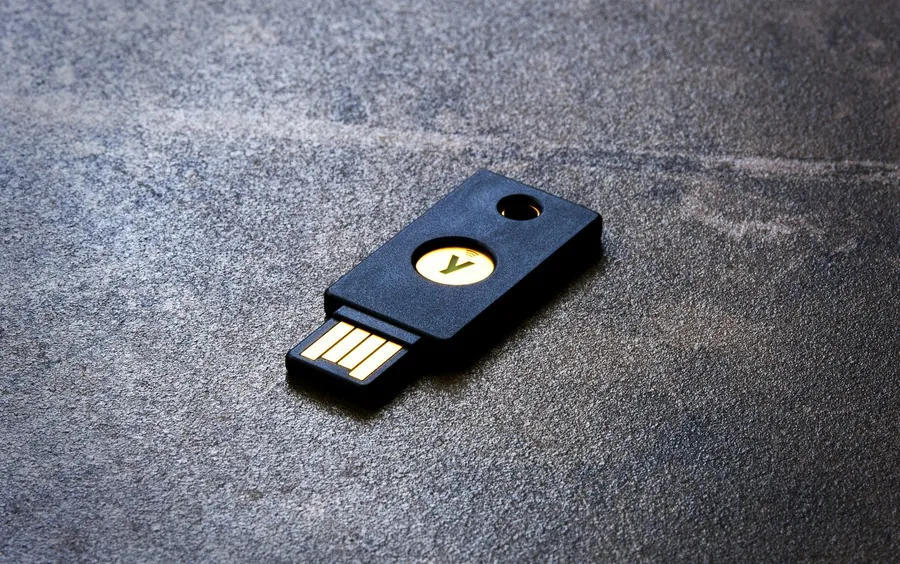This website uses cookies to ensure you get the best experience on our website. Learn more

YubiKey guide: What is a YubiKey and why should you use one?
Table of Contents
Stolen credentials remain one of the most common entry points for attackers, according to the Verizon Data Breach Investigations Report. Phishing campaigns, credential stuffing, and other credential-based attacks continue to evolve, targeting both cloud and on-premises systems.
To reduce reliance on passwords alone, many organizations have turned to multi-factor authentication (MFA). But not all MFA is created equal, and some methods are still vulnerable to social engineering and phishing. That’s where hardware-based authenticators like YubiKeys come in.
In this guide, we’ll explain what a YubiKey is, how it works, and why it offers one of the most secure and user-friendly ways to protect your identity and critical systems.
What is a YubiKey?
A YubiKey is a small hardware device that provides strong, physical multi-factor authentication. Designed by Yubico, it’s built to support a range of secure login protocols including FIDO2, WebAuthn, and one-time passwords (OTP).
YubiKeys are used to authenticate into services like Microsoft 365, Google Workspace, Windows logins, VPNs, and password managers. They’re designed to be simple to use, requiring just a tap or insertion to verify your identity.
How does a YubiKey work?
At a high level, a YubiKey works by securely storing a private key or secret on the device itself. When you authenticate, the YubiKey uses this key to sign a cryptographic challenge issued by the service you’re logging into. Since the key never leaves the device, it’s protected against interception and phishing.
Depending on the protocol in use, the YubiKey may generate an OTP, or perform a FIDO2/WebAuthn challenge-response handshake. Importantly, using a YubiKey requires physical presence, which adds a significant barrier against remote attacks.
Why is multi-factor authentication important?
Multi-factor authentication is a security measure that requires users to verify their identity using two or more factors; typically, this should be something they know (a password), something they have (a device), or something they are (biometrics). By combining these factors, MFA significantly reduces the likelihood that a compromised password alone will lead to a security breach.
With phishing, credential stuffing, and brute force attacks remaining among the most common causes of account compromise, MFA is an essential element of a robust security strategy. Even strong, complex passwords can be leaked or stolen, especially in hybrid and cloud-connected environments where users log in from multiple locations and devices.
To address these challenges, organizations are increasingly adopting phishing-resistant MFA, which provides stronger protection against modern attack techniques.
How do YubiKeys compare to other authentication methods?
Not all authentication methods offer the same level of protection. Many organizations adopt a mix of solutions, each with its own strengths and weaknesses in terms of usability and security. Let’s take a look at how YubiKeys compare to some other popular authentication methods:
Passkeys vs YubiKeys
Passkeys are a newer, passwordless authentication standard intended to replace traditional credentials with cryptographic key pairs. These credentials are typically stored on a user’s mobile device or computer and synced via the cloud.
While passkeys offer strong protection against phishing and password reuse, they’re still tightly bound to the user’s device and cloud ecosystem. This can present challenges in environments where employees use a mix of operating systems or personal devices.
YubiKeys offer a more portable alternative. YubiKeys can act as cross-platform passkeys, providing the same cryptographic protection without being tied to a specific vendor’s infrastructure.
SIM-based authentication vs YubiKeys
SMS MFA remains widely used due to its simplicity and familiarity. Users receive a one-time code via text message, which they then enter to verify their identity.
However, SIM-based authentication is highly vulnerable to social engineering and SIM-swapping attacks, where a threat actor convinces a mobile carrier to reassign a phone number to a different SIM card. Once they have control of the number, intercepting MFA codes is easy.
YubiKeys avoid these issues entirely. Since authentication is performed on a physical device that’s in the user’s possession, there are no codes to intercept, no secrets transmitted over the air, and no third-party dependencies. This makes YubiKeys a significantly more secure alternative to SMS-based MFA, particularly for privileged accounts or sensitive systems.
Authenticator apps vs YubiKeys
App-based authentication provides a middle ground between SMS and hardware tokens. These apps generate time-based OTPs that expire after a short window and aren’t transmitted over the network, making them more secure than SMS.
However, these codes can still be vulnerable to phishing via techniques like fake login pages. By contrast, YubiKeys eliminate the need for users to view or enter codes. Authentication requires direct physical interaction, making it resistant to phishing attacks.
Summary of YubiKeys vs other authentication methods
| Authentication Method | Phishing Resistance | Portability | Risk of Interception | Device Independence | Usability |
| YubiKey | High | High | Low | Yes | Simple |
| Passkeys | High | Limited | Low | No (device-bound) | Can be more complicated |
| SMS-based | Low | High | High | Yes | Simple |
| Authenticator Apps | Medium | High | Low | Yes | Simple |
Benefits of YubiKey authentication
1. Strong phishing resistance
YubiKeys use public-key cryptography to verify the user’s identity, so no shared secrets or codes are transmitted. Because the authentication process is bound to the domain requesting access, it can’t be tricked by lookalike login pages or man-in-the-middle attacks which makes phishing virtually impossible.
2. Convenient user experience
Users simply tap or insert the device to authenticate; no need to manually enter codes, approve push notifications, or juggle multiple authenticator apps. This reduces login friction and lowers the chances of MFA fatigue or user error.
3. Portable and durable
YubiKeys are designed to work across a wide range of devices, including desktops, laptops, and mobile phones. Their robust physical design also makes them ideal for users on the go or in field-based roles.
4. Reliable offline use
Unlike mobile-based authentication methods that rely on an internet or cellular connection, YubiKeys work fully offline. This makes them a strong choice for securing access to systems in air-gapped environments, remote locations, or during outages.
5. Enterprise scalability
YubiKeys can be deployed at scale using centralized management tools and identity platforms. They support group policy enforcement, user self-registration, and recovery workflows, enabling IT teams to roll out secure MFA without overburdening the helpdesk.
6. Secure by design
Private keys and authentication secrets never leave the YubiKey, and the device itself is designed to resist tampering and extraction. This hardware-backed security model eliminates many of the risks associated with mobile MFA and helps organizations meet strict compliance standards.
Why passwords still matter
While YubiKeys provide a powerful layer of protection against phishing and other attacks, passwords remain a critical part of securing access. Even with strong MFA in place, a compromised or weak password can still be the entry point for attackers.
That’s why maintaining strong, unique passwords – and continuously monitoring for those exposed in breaches – remains essential. When combined with hardware-based MFA like YubiKeys, strong password hygiene helps ensure your defenses are truly layered and resilient.
Specops Password Policy strengthens your password strategy by enforcing customizable rules in Active Directory and automatically blocking compromised passwords. Want to see how it fits into your security posture? Get in touch for a personalized demo.
Best practices for secure YubiKey use
Like any security tool, YubiKeys need to be used carefully to avoid operational risks. Here are some best practices to keep in mind:
- Provide backup keys: Make sure users are issued at least one spare key in addition to their primary device. This helps reduce the risk of lockouts and ensures business continuity in the event of loss, theft, or hardware failure.
- Educate end users: Offer thorough training and onboarding guides to help users understand how and when to use the key.
- Define fallback procedures: Establish a secure recovery flow for lost or unavailable keys. This might include robust identity verification via the IT helpdesk, or integration with self-service password reset tools to ensure users can regain access without compromising security.
- Layer with secure password policies: While YubiKeys add a strong authentication layer, they should complement – not replace – existing password security best practices. Enforce strong password policies, like the use of passphrases, and monitor for known compromised passwords.
Secure YubiKey authentication with Specops Secure Access
YubiKeys offer strong protection, but true security requires seamless integration with your identity infrastructure. That’s where Specops Secure Access comes in.
Specops Secure Access supports hardware-based authentication with YubiKeys for Windows login, remote desktop access, and VPN connections. It allows you to enforce phishing-resistant MFA with YubiKeys or authenticator apps, including the Specops:ID mobile app. Sign up for a free trial of Specops Secure Access today.
Last updated on November 14, 2025




